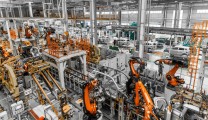What is the cost of production?
Manufacturing costs are the sum of all costs associated with the production of finished products. These costs include: Labor costs, raw material costs, and general manufacturing costs .
A quality product at a reasonable price is the result of production management in general and production cost management in particular. Effective production cost management helps managers grasp production progress and production schedule . From there, they can find ways to optimize production quality and costs. Therefore, businesses need to clearly understand production costs in operation and control them closely.

Production costs are an important type of cost in a business's production activities.
In addition, when allocating finances, businesses also need to understand and clearly distinguish between production costs and production costs. Production costs are costs directly incurred for the production of products in the workshop (including direct materials, direct labor, general production costs). Meanwhile, production costs include both production costs and indirect costs contributing to the production process (such as: Company accountant's salary or office supplies, management costs, etc.

Difference between cost of production and production cost
Classification of production costs
By economic nature
Classifying production costs based on economic nature helps businesses grasp the proportion and structure of each type of cost that needs to be spent in a certain period of time. Specifically including:
- Direct material costs: Directly related to production and specifically determined for each product. Can include main materials, accessories, packaging.
- Direct labor costs: Directly related to production and determined specifically for each product. Can include salaries, allowances, insurance.
- Manufacturing overhead: Related to production but cannot be specifically identified for each product. Examples include depreciation of fixed assets, maintenance, repairs, indirect materials, indirect labor, and outsourced services.

Classifying costs by economic nature helps businesses grasp the proportion of each cost.
According to use and purpose
If we classify production costs according to their uses and purposes, we will have:
- Raw material costs: Including costs of main raw materials, accessories, packaging, etc.
- Labor costs: Including salary, allowances, insurance, etc.
- General production costs: Including fixed asset depreciation, maintenance, repair, indirect materials, indirect labor, outsourced services, etc.
- External service costs: Including transportation, insurance, agent commission, brokerage, etc.
- Production equipment costs: Including purchase, maintenance, repair of production equipment, etc.
- Other costs: Includes costs that do not fall into the above categories, such as research and development, production management, etc.
This classification makes tasks such as managing production costs according to standards and calculating the cost of products of the enterprise easier to perform. In addition, the enterprise also knows the status of product plan implementation. This is also the basis for planning production capacity and planning costs in the next production period.

This classification helps businesses easily manage costs and calculate product prices.
According to the relationship with the volume of work, products in the period
When classifying production costs according to the relationship with the volume of work and products in the period, it can help managers find the break-even point. This is also the basis for businesses to make policies and business decisions such as changing product prices to increase business efficiency. Specifically including:
- Variable cost: Changes with the volume of products and work completed, such as direct materials and direct labor.
- Fixed cost: Does not change with the volume of products and work completed within a certain range, such as fixed asset depreciation and property insurance costs.

Variable costs and fixed costs
According to the production process, manufacturing
Production costs are classified according to their relationship with the production technology process into the following types:
- Raw material costs: Arising from the use of raw materials in the production process.
- Labor costs: Arising from the use of labor in the production process.
- General manufacturing costs: Incurred during the production process but cannot be specifically identified for each type of raw material cost and labor cost.
Dividing these costs into two helps businesses determine the correct direction as well as propose measures to maximize cost savings for each type. The proposed methods will determine the business's profits.

Cost classification according to production and manufacturing process includes two types: basic and general costs.
According to the method of cost aggregation into cost-bearing objects
Production costs classified in this manner will include the following types:
- Cost of each product, good, service
- Cost of each department, workshop
- Cost of raw materials
- Labor costs
This classification helps businesses have a reasonable cost division policy for objects through determining the aggregate accounting method.

Direct and indirect costs
Formula for calculating production costs
The formula for calculating manufacturing costs can vary depending on the type of product, service, industry, and how the business organizes its data. However, here is a basic formula:
Production cost = Raw material cost + Production labor cost + Machinery and equipment cost + Production management cost + Other costs
In there: :
- Raw material costs: Includes the cost of purchasing and handling raw materials.
Formula: Cost of raw materials = Quantity of raw materials required x Unit value of raw materials
- Manufacturing labor costs: Includes wages and benefits for production employees.
Formula : Production labor cost = Number of labor hours required x Average wage of production labor
- Machinery and equipment costs: Includes costs of using and maintaining machinery and equipment.
Formula: Cost of machinery and equipment = Value of machinery and equipment / Average life of machinery and equipment
- Production management costs: Includes salaries and benefits of management staff, along with the cost of operating the production facility.
Formula: Production management costs = Salaries and benefits of production management staff + Production facility operating costs
- Other costs: Includes costs not included in the above categories such as transportation, insurance, rental space and other support costs.

The formula for calculating production costs includes many components.
Examples of manufacturing costs in business
To help you visualize the production costs in a business, here are specific examples of production costs that may arise in a woodworking factory:
- Raw material costs: Cost of purchasing wood, glue, paint and other materials needed to manufacture wooden products such as tables, chairs, cabinets.
- Labor costs: Includes wages, social insurance, allowances for carpenters, painters and workers involved in the production process.
- Machinery and equipment costs: Cost of using and maintaining machinery such as saws, sanders, paint sprayers and other mechanical tools.
- Production management costs: Includes factory management staff salaries, factory operating costs and other allowances for management staff.
- Other costs: Include costs of transporting raw materials and products, marketing costs to promote products, factory maintenance costs and research and development costs to improve products and production processes.












Replies to This Discussion